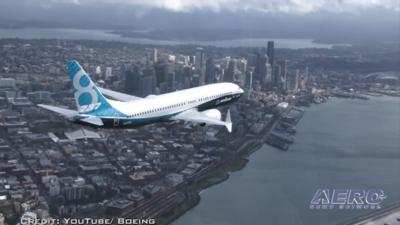Federal Appeals Court Ruling Bolsters 737 MAX Recovery
A federal appeals court has rejected a class-action lawsuit accusing Boeing and Southwest Airlines of suppressing knowledge of the 737 MAX’s design flaws, thereby placing the flying public in harm’s way.

The case was among the most significant consumer legal actions resultant of a pair of 737 Max-8 accidents that claimed a combined total of 346 lives between 2018 and 2019 and occasioned extensive worldwide investigation of the model’s airworthiness.
Originally filed in 2019 subsequent the grounding of the 737 Max fleet amongst allegations that Boeing had long been aware of defects with the aircraft’s Maneuvering Characteristics Augmentation System (MCAS) software—the lawsuit alleged that Dallas-based Southwest Airlines, Boeing’s largest 737 Max customer, was likewise aware of the MCAS’s shortcomings and opted to conceal subject knowledge from the public.
The plaintiffs argued that Boeing and Southwest conspired to duped travelers into flying aboard aircraft afflicted with a known design flaw.
Southwest Airlines has consistently asserted that claims alleging it had knowledge of or purposefully withheld data pertaining to shortcomings in the design of the MCAS or any other 737 MAX systems are “completely without merit.”
The Maneuvering Characteristics Augmentation System (MCAS) is a flight control supplement managed by the flight control computer (FCC) and introduced on the 737 MAX for purpose of rendering its handling characteristics similar to, if not indistinguishable from, those of the Next Generation 737 models—particularly at slow speeds and high angles of attack.
The lawsuit argued: “The actual prices of the tickets that were purchased as a result of the misrepresentations by Southwest and Boeing about the safety of the MAX 8 and MAX Series Aircraft were significantly higher than the value of those tickets, which for many, if not most, passengers was zero.”
However, in a 3-0 decision, the Fifth Circuit Court of Appeals reversed the case’s class-action status and ordered it sent back to the lower court “with instructions to dismiss the case for lack of jurisdiction.”
Appeals Court Judge opined: “In sum, plaintiffs have not plausibly alleged any concrete injury. They concededly have suffered no physical harm. They have offered no plausible theory of economic harm.”

In a controversial plea deal, Boeing paid $2.5-billion to settle charges stemming from the aforementioned 737 MAX accidents. Notwithstanding the sizable award, family members of the crash victims are currently endeavoring to challenge the settlement—which included $1.77-billion in payments to airlines, $500-million for families, and a $243.6-million criminal fine. Per the plea deal, no Boeing employees—excepting chief technical pilot Mark Forkner—were held personally responsible for the 737 MAX’s failures. Forkner was subsequently tried on fraud charges and found not guilty by a North Texas jury.
In all, the 737 MAX crisis prompted Congress, the U.S. Department of Transportation, and the U.S. Department of Justice to undertake independent investigations of the means by and extent to which Boeing succeeded in pushing a critical design flaw past Federal Aviation Administration (FAA) regulators and into production and regular airline service.
Compelled by record losses of revenue and reputation, Boeing ousted several top executives, including then CEO Dennis Muilenburg.
The 737 Max was re-certified by the FAA in late 2020, and air-carriers—to include Dallas-based Southwest Airlines—returned the model to service the following year.
 SpaceX to Launch Inversion RAY Reentry Vehicle in Fall
SpaceX to Launch Inversion RAY Reentry Vehicle in Fall Aero-News: Quote of the Day (04.23.24)
Aero-News: Quote of the Day (04.23.24) Aero-News: Quote of the Day (04.20.24)
Aero-News: Quote of the Day (04.20.24) ANN's Daily Aero-Linx (04.20.24)
ANN's Daily Aero-Linx (04.20.24) Aero-News: Quote of the Day (04.21.24)
Aero-News: Quote of the Day (04.21.24)




